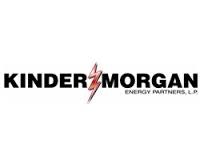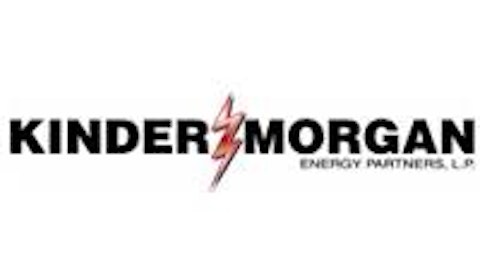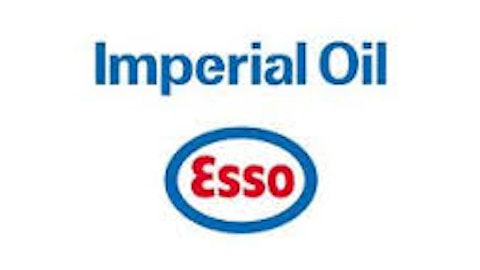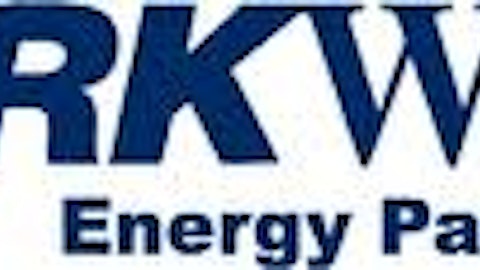Kinder Morgan Energy Partners LP (NYSE:KMP) is the largest U.S. pipeline company and, in its latest quarter, saw net income increase three times to $783 million from $206 million on a year-to-year basis. The company is deriving incremental benefits from its pipeline system with its recent purchase of Tennessee Gas Pipeline and the partial acquisition of El Paso Natural Gas Co. For the future, Kinder Morgan Energy Partners LP (NYSE:KMP) has entered into a long-term contract to support the expansion of Sweeny Lateral pipeline. The expansion is expected to increase capacity to 100,000 barrels per day. Environmentalists and potential hazards from oil spills have halted projects on multiple fronts for the company and it seems that Kinder Morgan Energy Partners LP (NYSE:KMP) will have to settle a lot of issues in the courtroom before it can continue with its expansion of the oil sands pipeline system.
While Enbridge Energy Partners, L.P. (NYSE:EEP) has similar ideas for expanding and capitalizing on the present demand, things have been less than ideal for the Calgary based company. In its latest quarter estimates, the company reported adjusted earnings of $0.18 per unit, missing analysts’ estimates of $0.26. The quarterly figure also deteriorated 43.8% from the previous year’s profit of $0.32. Enbridge Energy Partners, L.P. (NYSE:EEP)’s growth is highly dependent upon organic growth, i.e., pipelines. The company has ambitious goals as it aims to build a pipeline whose capacity would eclipse even TransCanada (NYSE:TRP)’s proposed Keystone XL. However, as with Kinder Morgan Energy Partners LP (NYSE:KMP), there are legal and environmental hurdles which currently bar the company from moving forward.
Enterprise Products Partners L.P. (NYSE:EPD) controls 50,700 miles of natural gas, NGL crude oil, petrochemicals and refined products pipeline. The company plans to invest $7.2 billion into capital expansion projects. A major part of this capital expenditure will be invested in the current year, because an increase in demand from the petrochemical industry seems to be the main factor for company growth. The company can benefit greatly from increased production of natural gas, NGL and crude oil from the shale plays. Enterprise Products Partners L.P. (NYSE:EPD) delivers a very impressive dividend yield at 4.4% when compared to the yield of the company’s peers (1-2%). In fact, the 4.4% yield is 2.5% above the 10-year treasury rate (1.9%), in line with the historical MLP spread over the 10-year.
Potential risks
I think the biggest concerns for any investor in MLPs are related to opposition to pipeline construction, commodity risk and declines in demand. Commodity risk and declines in demand affect the industry across the board, which leaves one with the threat of opposition to pipeline construction.
Enbridge Energy Partners, L.P. (NYSE:EEP) has a history of confrontations with environmental agencies because of its countless pipeline spills throughout its history. One member of Congress also describe the company as follows: “Enbridge is fast becoming to the Midwest what BP was to the Gulf of Mexico.” In 2012 alone, the company paid $134 million for its Line 6B leak. The most recent problem that the company is facing with environmentalists is with the proposed upgradation of the existing pipeline from Alberta to Wisconsin. The upgradation will see the pipeline double its capacity to 800,000 barrels per day, and there are grave concerns about the threat to the environment that this will pose. There is so much concern that the expansion faces an increasing risk of U.S. rejection as opposition to pipelines grows. Furthermore, the company faces stiff resistance for its Northern Gateway pipeline to the West Coast as well.
Kinder Morgan Energy Partners LP (NYSE:KMP), on the other hand, is facing opposition to its requests for a pipeline in the Arctic area. The prospects of an Arctic pipeline would face serious challenges from environmentalists as well as possible resistance from the aboriginal communities along the route. There also exists the threat that unpredictable ice conditions in the Beaufort Sea could block ports. On the political forefront, the leader of the opposition party most likely to win next month’s election in British Columbia expressed major doubts about Kinder Morgan Energy Partners LP’s plan to more than double the capacity of its existing Trans Mountain pipeline from Alberta to Vancouver.
Enterprise Products (NYSE:EPD) Partners has a very small window to grow its dividend payout ratio, because their heavy debt seems to be a drag on the company’s earnings. Future earnings growth for Enterprise is expected at 5% per year for the next five years. Another alarming matter is the current level of their P/B ratio (3.94). If the company shows signs of weakness, the P/B indicator is at risk of decompressing, pulling the stock price down.
Key points
Kinder Morgan and Enbridge Energy Partners, L.P. (NYSE:EEP) both are facing fundamental barriers to expansion at a time when the production in Canadian oil sands is booming. While Enbridge struggles with organic growth, Kinder Morgan has managed to become the largest midstream and third largest energy company in North America, which gives it some power to marginalize the threats of opposition. Enbridge Energy Partners, L.P. (NYSE:EEP), on the other hand, suffers when its pipelines are shut down for one reason or another.
For Enterprise Products Partners, the company currently delivers juicy dividends and has a very strong growth history, a solid backlog of new projects and high distribution coverage ratio; however, there is little potential for future growth of the dividend yield. I recommend waiting for a pullback, before investors start their position.
Marina Avilkina has no position in any stocks mentioned. The Motley Fool recommends Enterprise Products Partners L.P.
The article Juicy MLPs: Know Your Risks, or Risk Your Future originally appeared on Fool.com and is written by Marina Avilkina.
Marina is a member of The Motley Fool Blog Network — entries represent the personal opinion of the blogger and are not formally edited.
Copyright © 1995 – 2013 The Motley Fool, LLC. All rights reserved. The Motley Fool has a disclosure policy.




